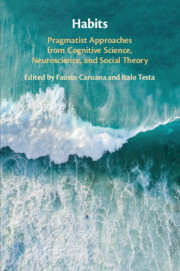Book contents
- Habits
- Habits
- Copyright page
- Contents
- Contributors
- The Pragmatist Reappraisal of Habit in Contemporary Cognitive Science, Neuroscience, and Social Theory: Introductory Essay
- Part 1 The Sensorimotor Embodiment of Habits
- Part II The Enactment of Habits in Mind and World
- Part III Socially Embeddded and Culturally Extended Habits
- 14 Growing Minds
- 15 “Habit Is Thus the Enormous Flywheel of Society”
- 16 Habit and the Human Lifespan
- 17 Habits and the Enculturated Mind
- 18 Brain, Body, Habit, and the Performative Quality of Aesthetics
- 19 A Habit Ontology for Cognitive and Social Sciences
- 20 Social Ontology between Habits and Social Interactions
- 21 Social Reproduction Feminism and Deweyan Habit Ontology
- Index
- References
21 - Social Reproduction Feminism and Deweyan Habit Ontology
from Part III - Socially Embeddded and Culturally Extended Habits
Published online by Cambridge University Press: 24 November 2020
- Habits
- Habits
- Copyright page
- Contents
- Contributors
- The Pragmatist Reappraisal of Habit in Contemporary Cognitive Science, Neuroscience, and Social Theory: Introductory Essay
- Part 1 The Sensorimotor Embodiment of Habits
- Part II The Enactment of Habits in Mind and World
- Part III Socially Embeddded and Culturally Extended Habits
- 14 Growing Minds
- 15 “Habit Is Thus the Enormous Flywheel of Society”
- 16 Habit and the Human Lifespan
- 17 Habits and the Enculturated Mind
- 18 Brain, Body, Habit, and the Performative Quality of Aesthetics
- 19 A Habit Ontology for Cognitive and Social Sciences
- 20 Social Ontology between Habits and Social Interactions
- 21 Social Reproduction Feminism and Deweyan Habit Ontology
- Index
- References
Summary
This chapter draws upon John Dewey's habit ontology in order to spell out the metaphysical commitments of social reproduction feminism. First, it outlines the current feminist debates around social reproduction (SR) in order to show where and to what extent this notion demands further conceptualization. It then presents an account of SR that hinges on Dewey's concept of habituation, which can be characterized as a spiral of second and first nature. It goes on to show how this conception of habit can help articulate SR's role in the production of persons, the maintenance of social groups and even in the reproduction of society. This discloses a perspective on the role of SR as enabling both social domination and transformation. Finally, we recapitulate and conclude by noting some implications of the resulting habit ontology of SR for feminist political thought.
- Type
- Chapter
- Information
- HabitsPragmatist Approaches from Cognitive Science, Neuroscience, and Social Theory, pp. 438 - 458Publisher: Cambridge University PressPrint publication year: 2020
References
- 3
- Cited by



